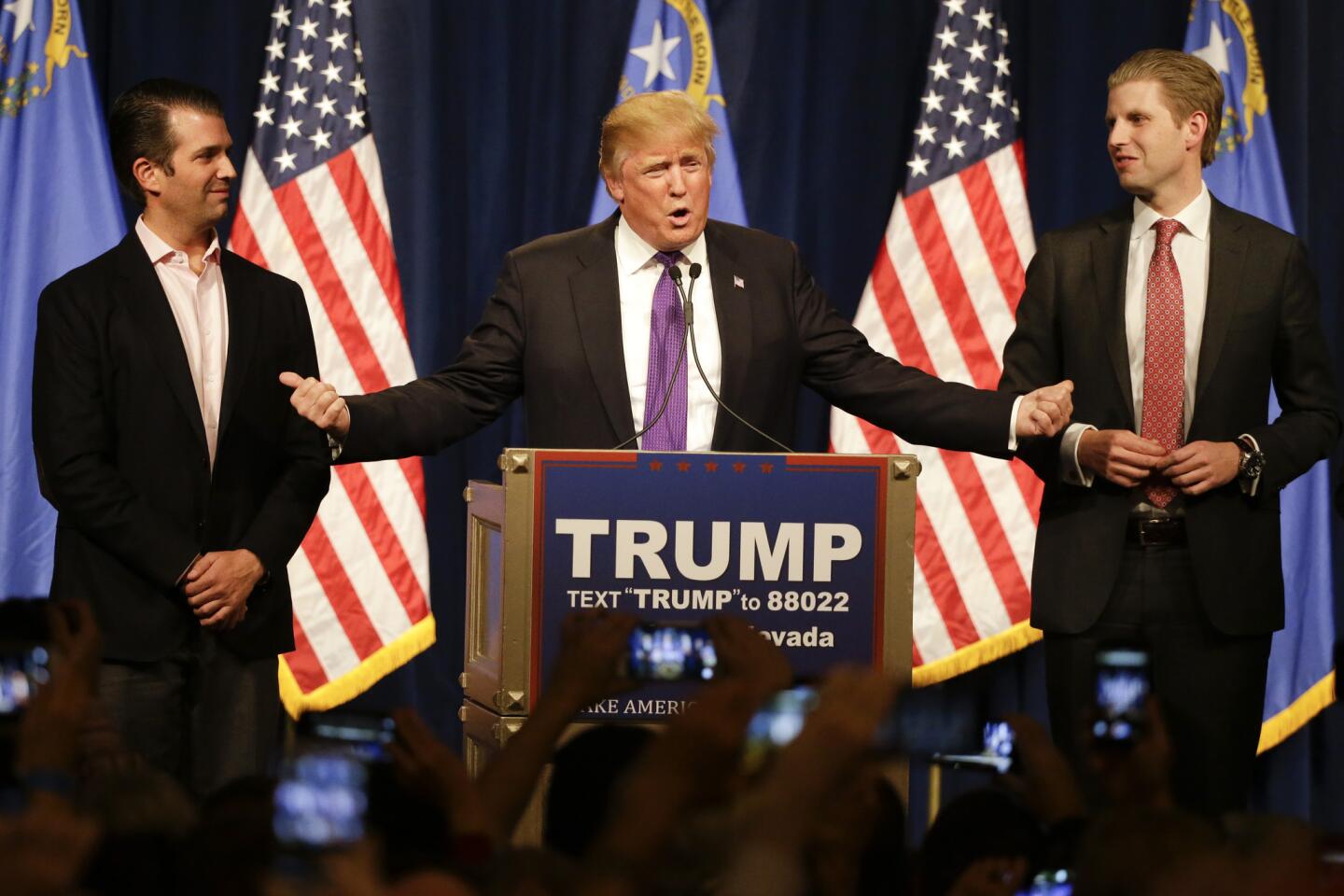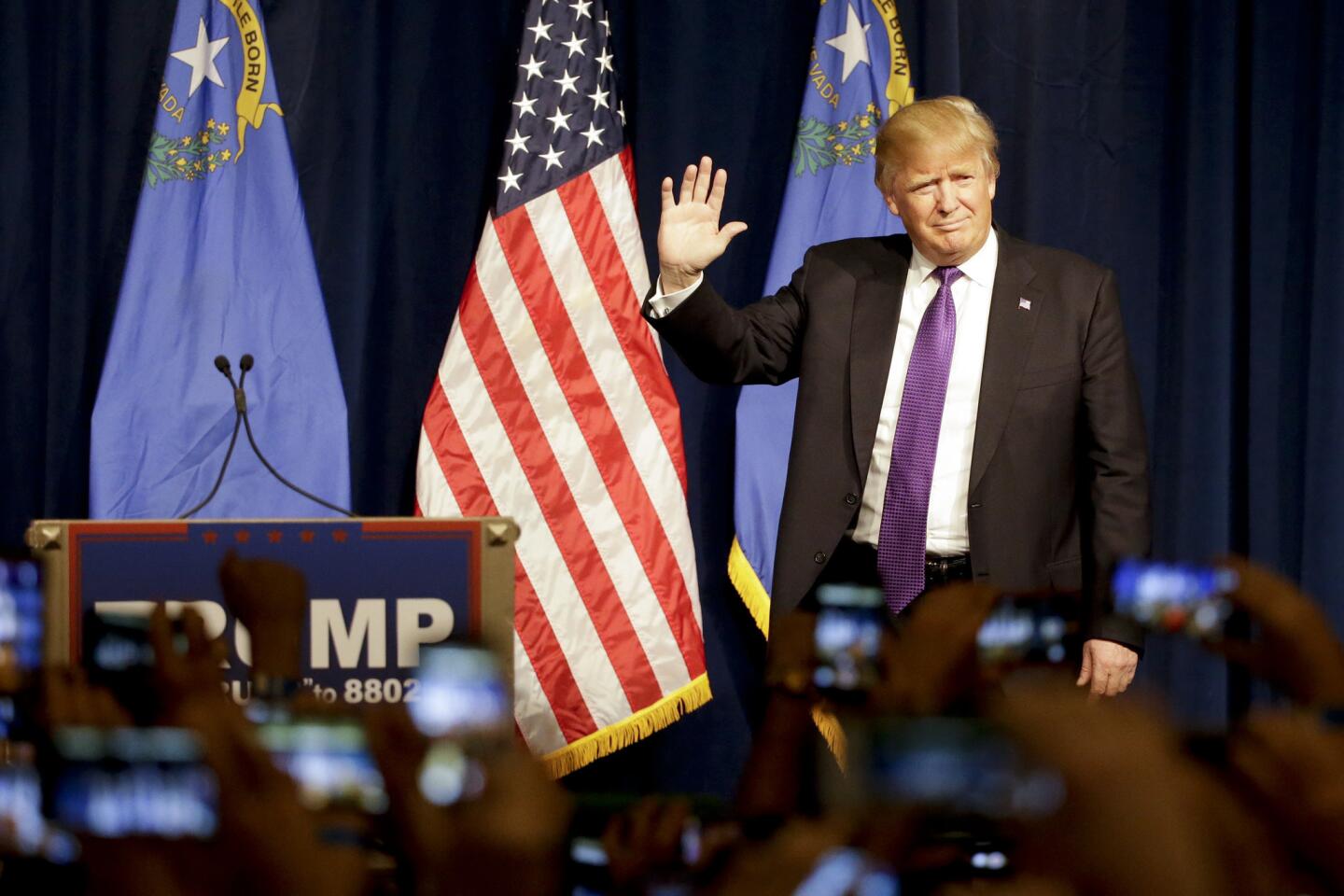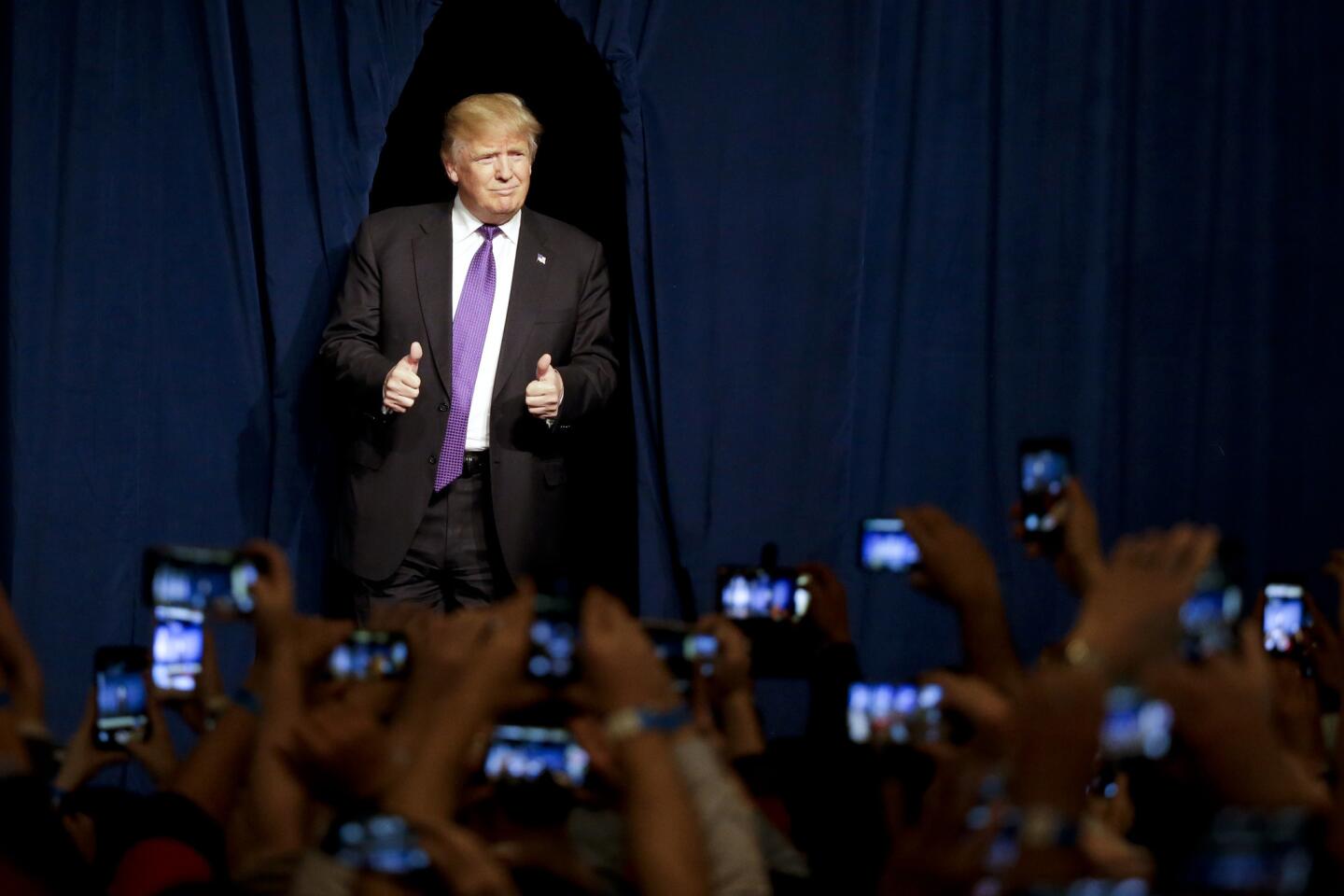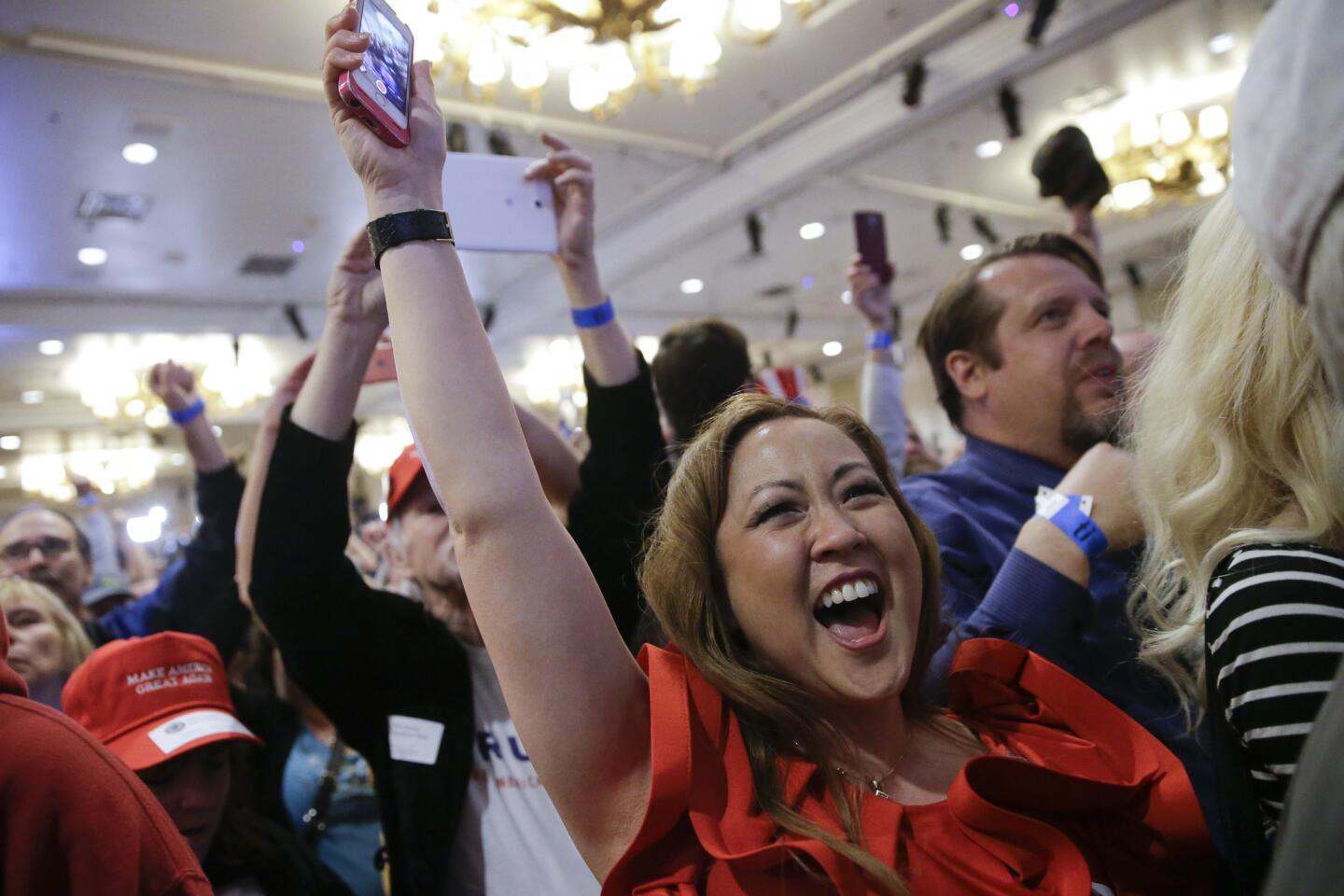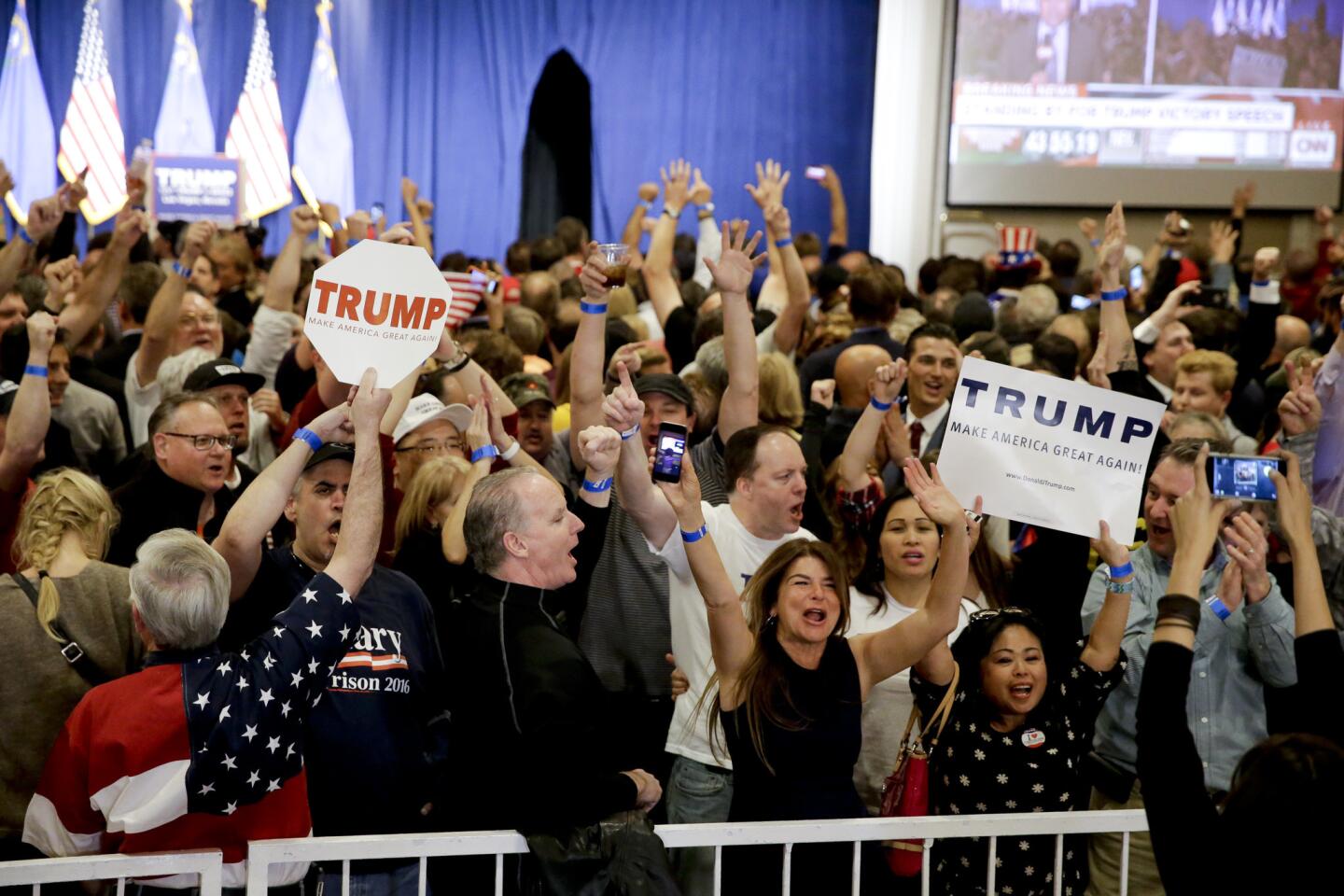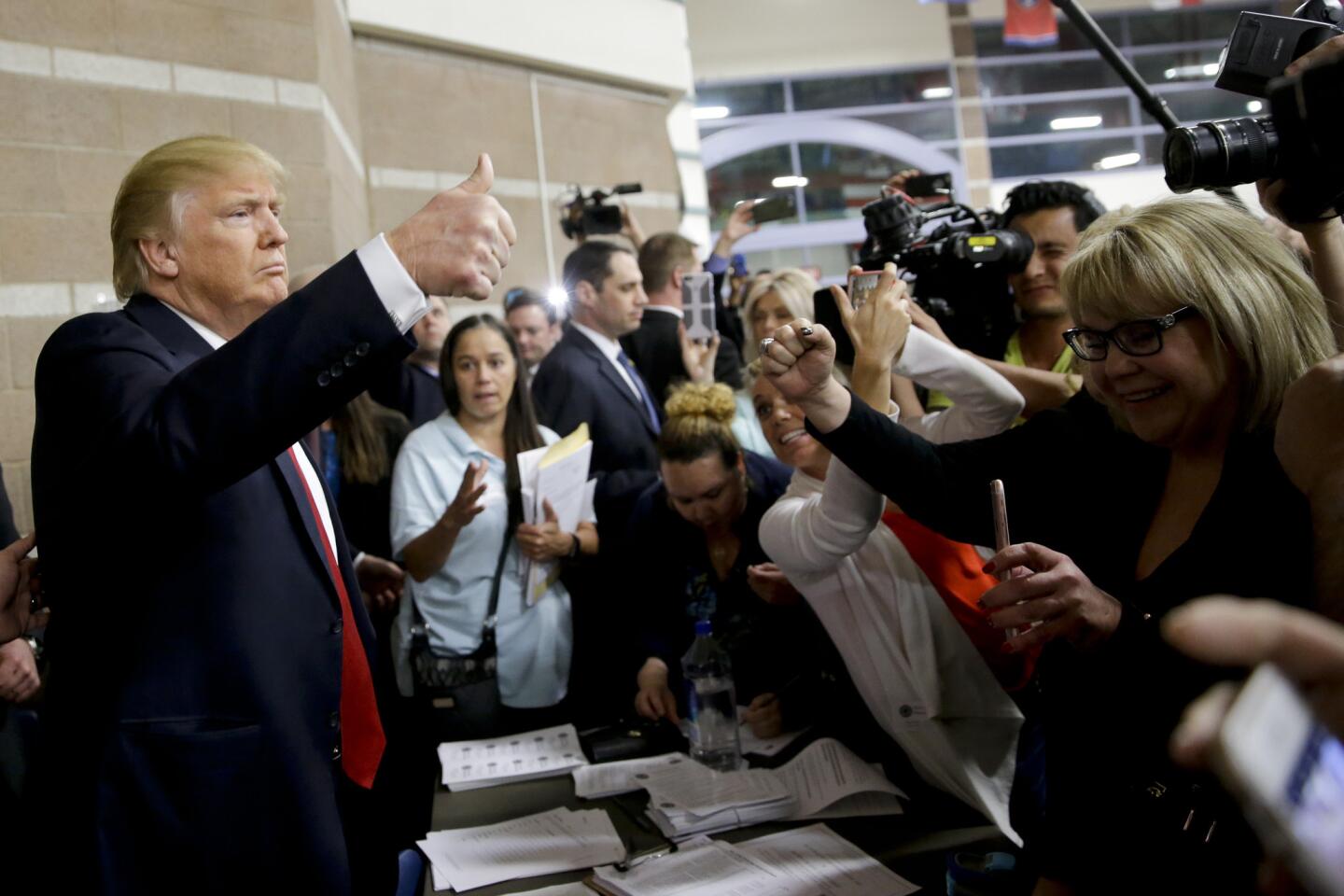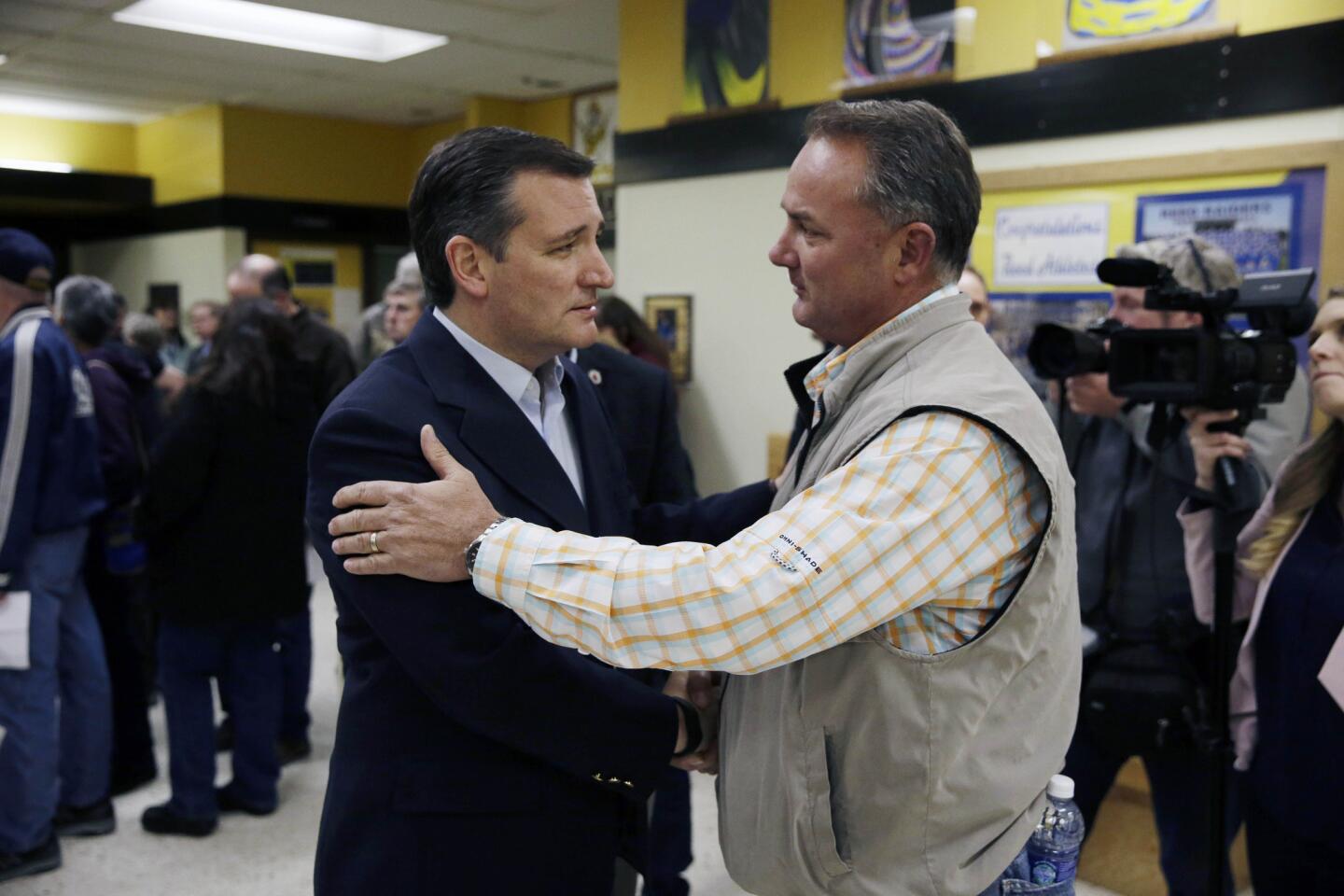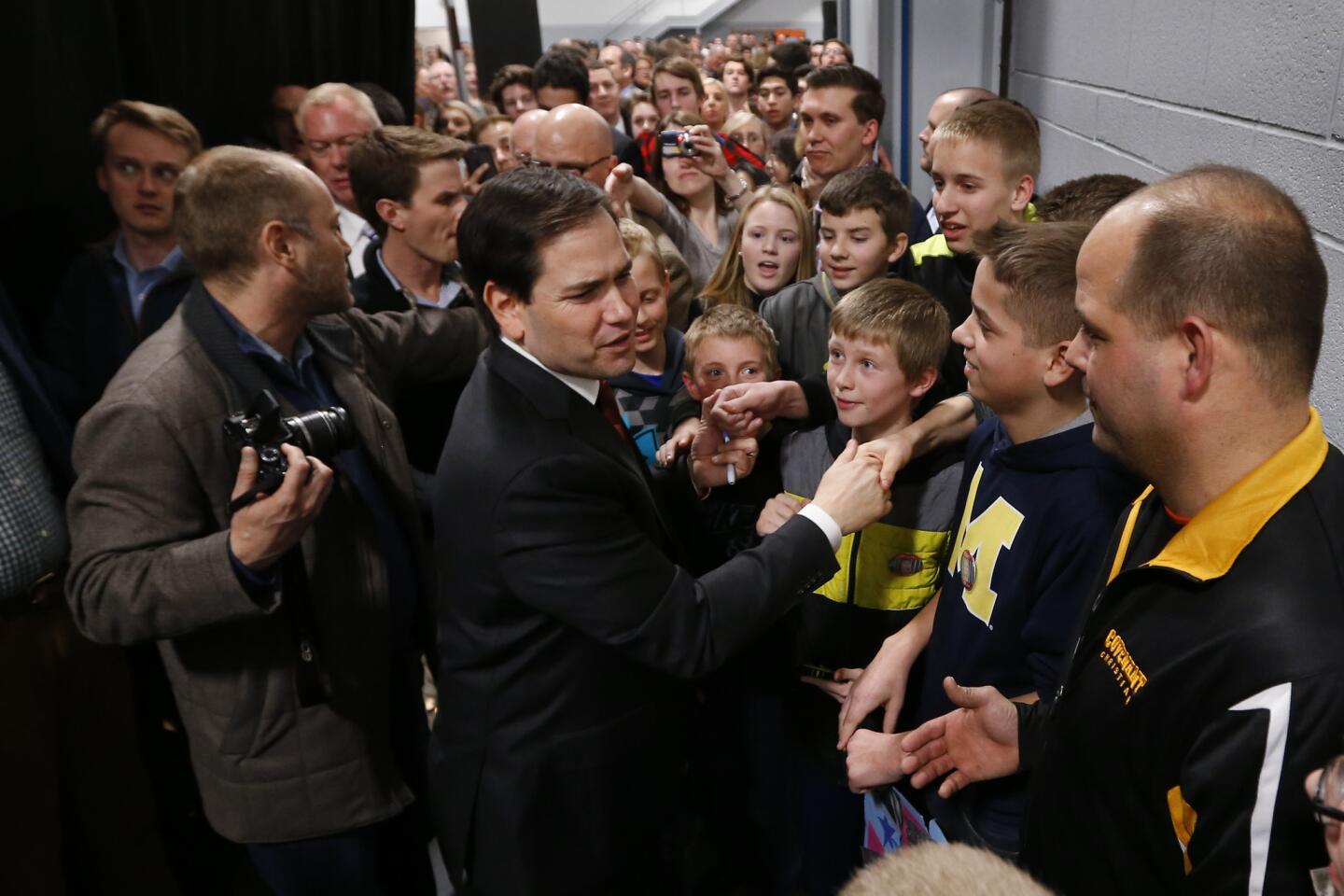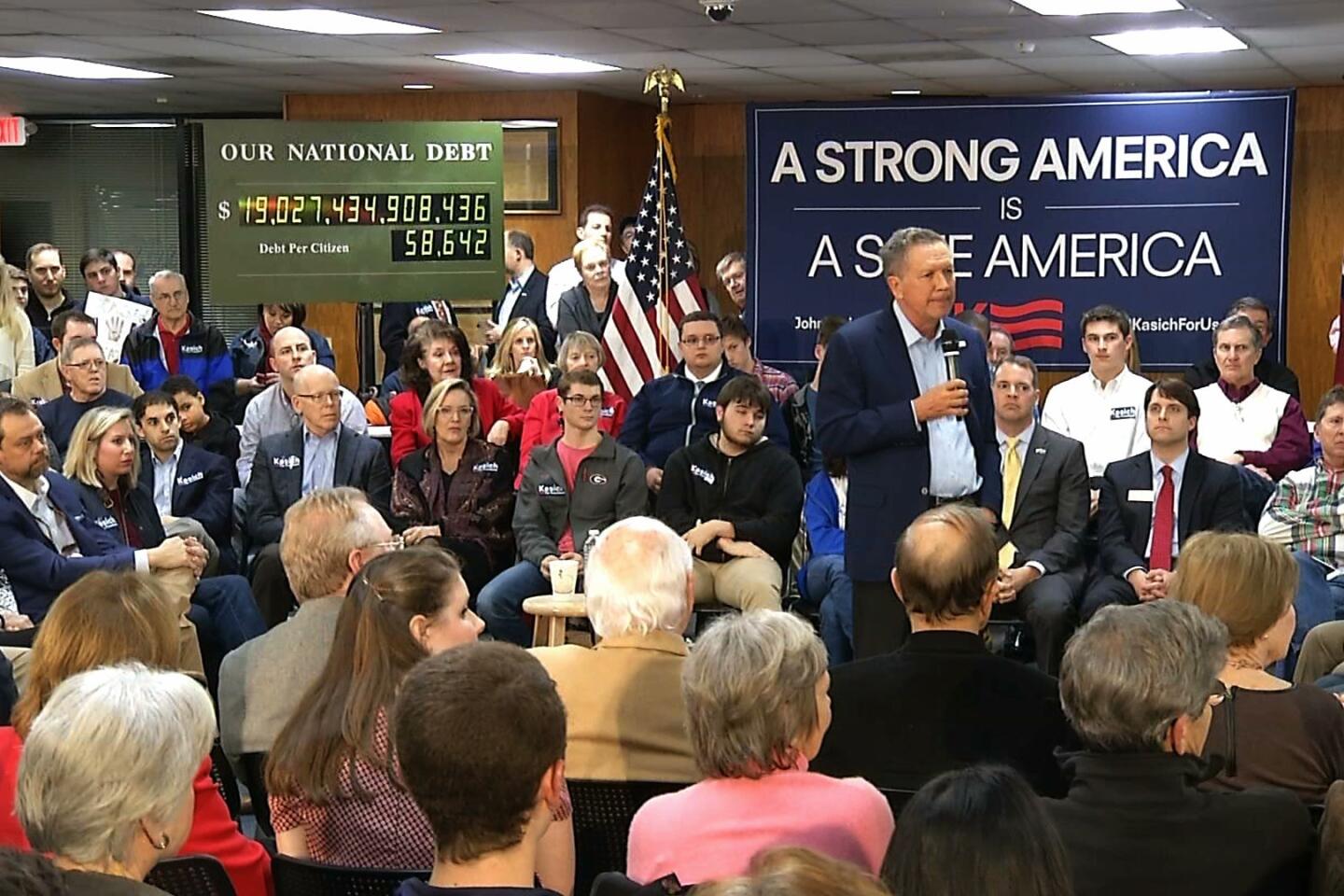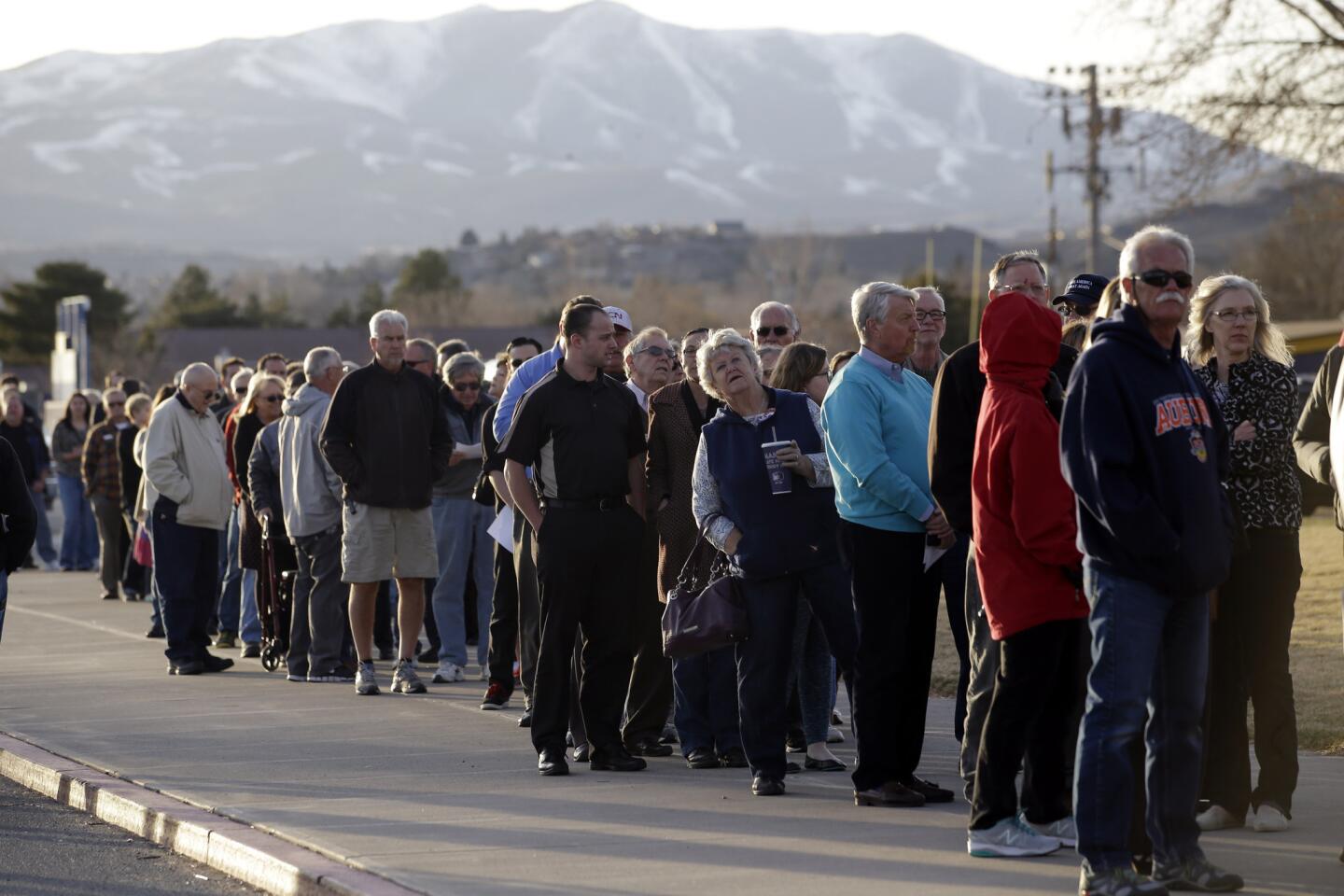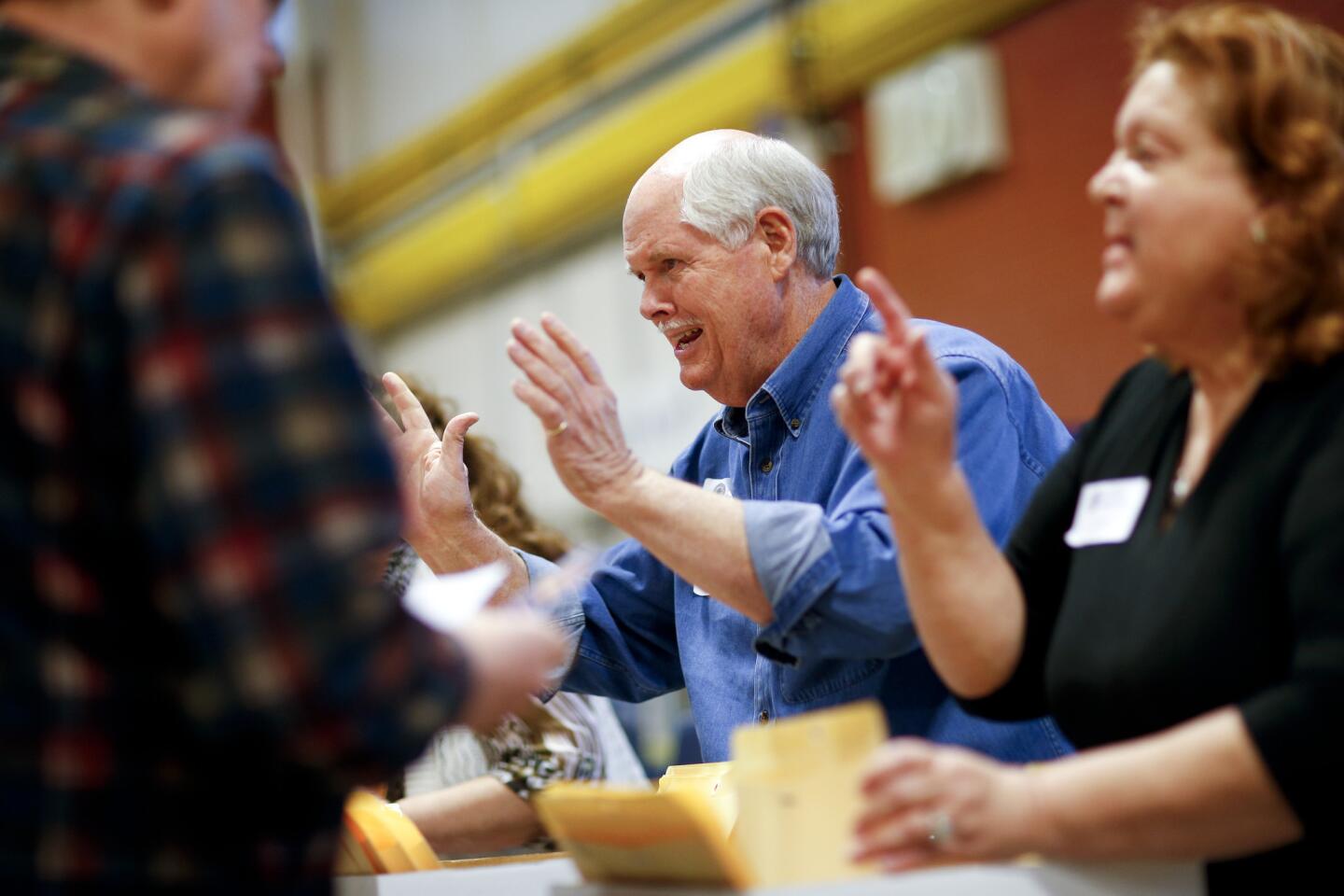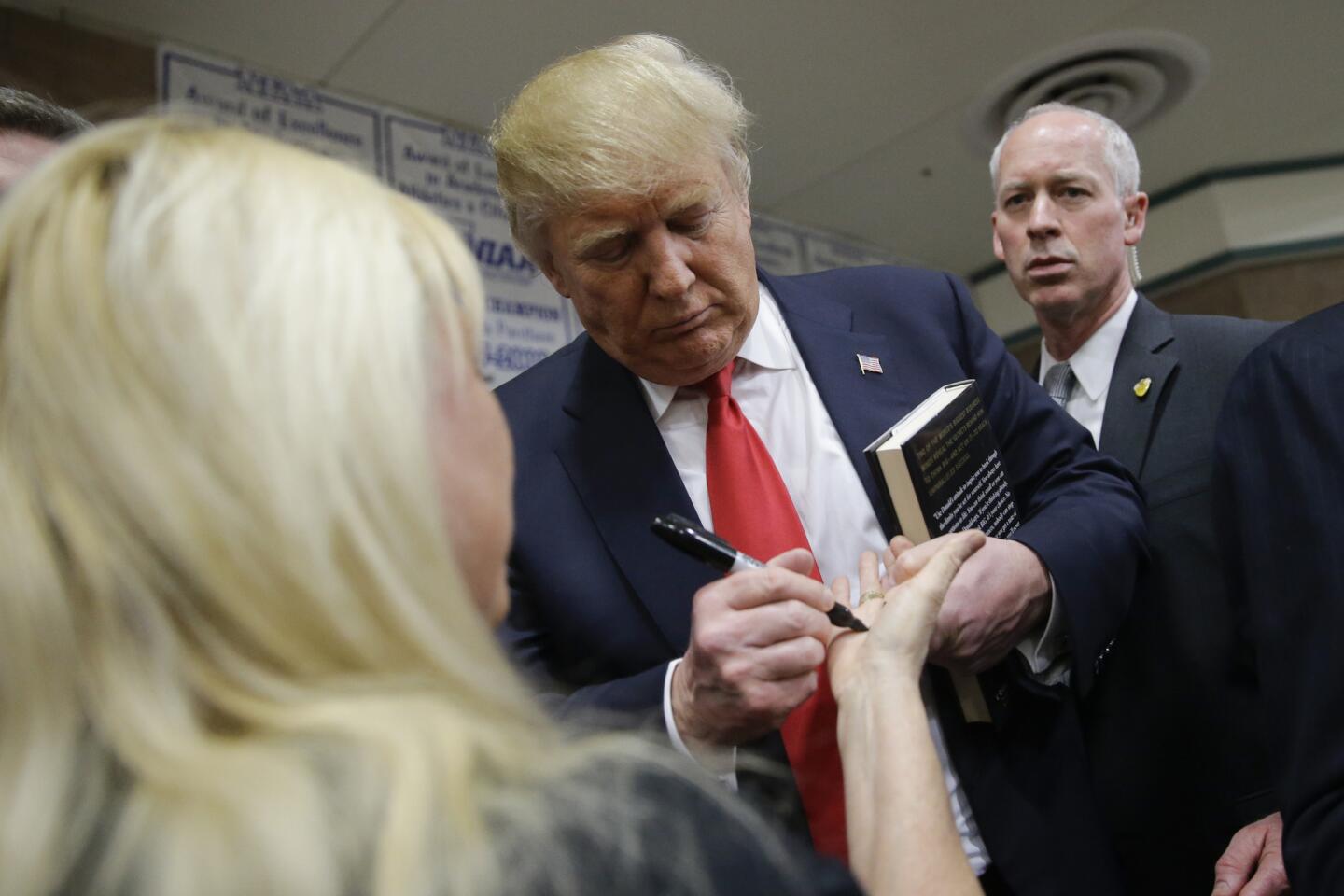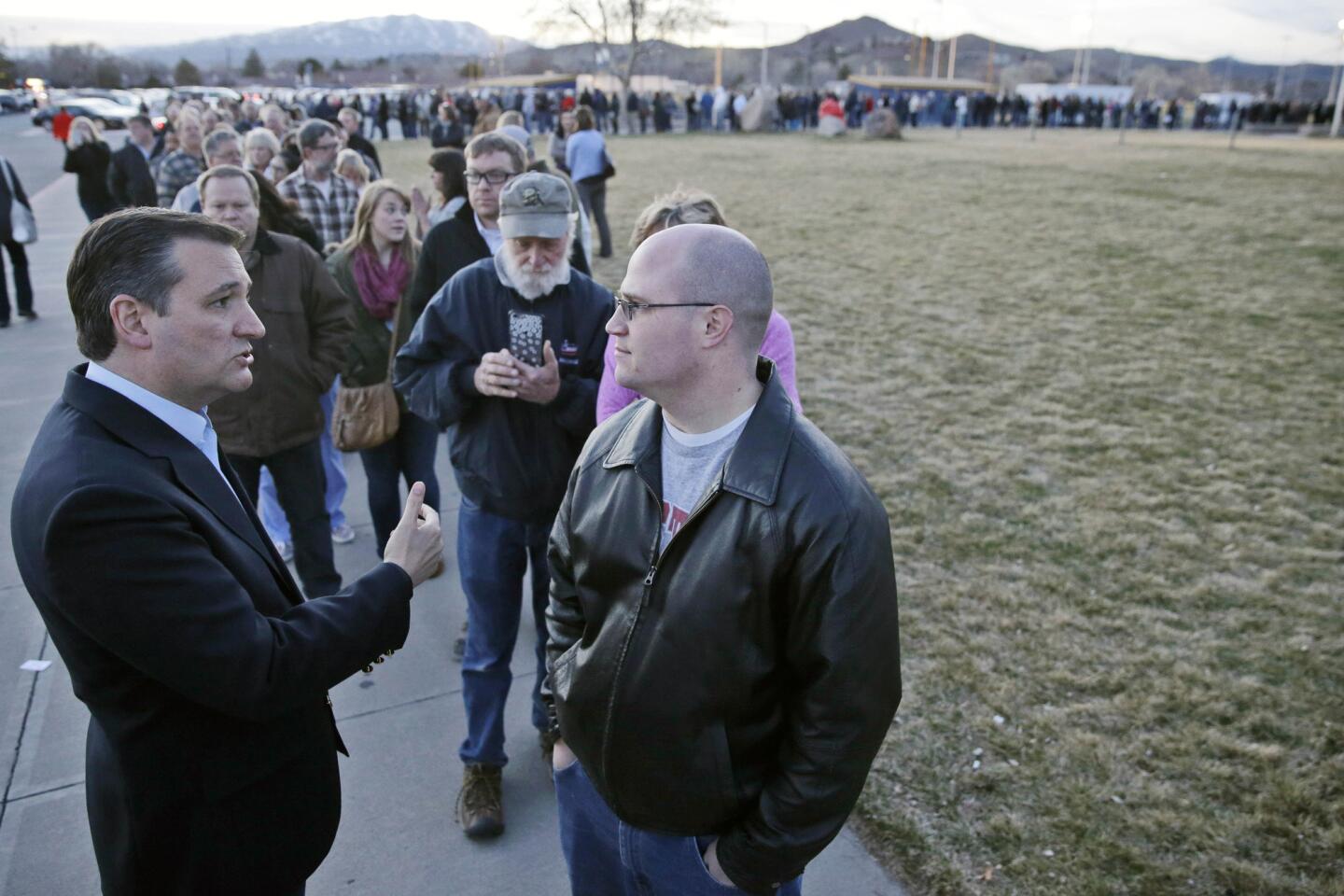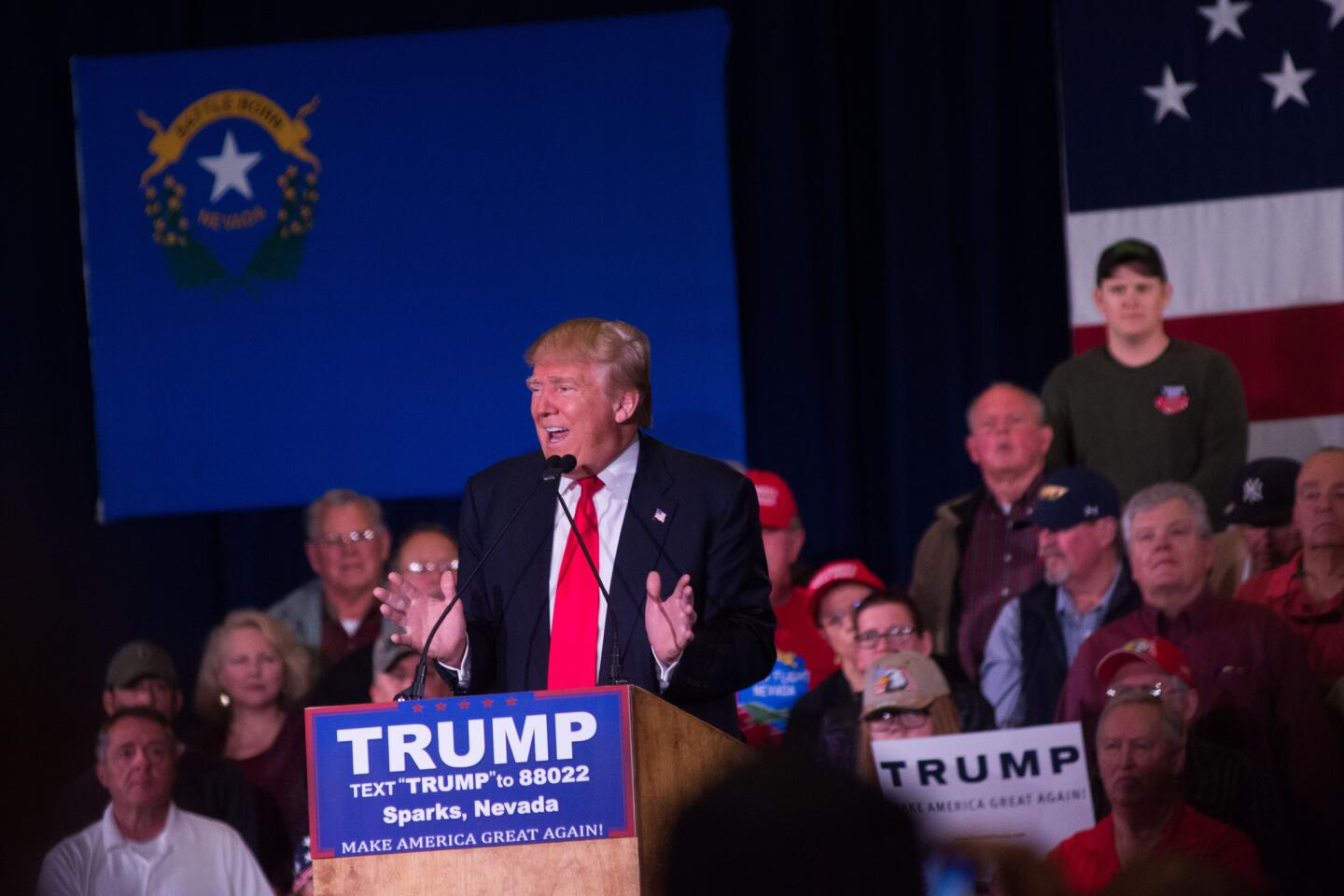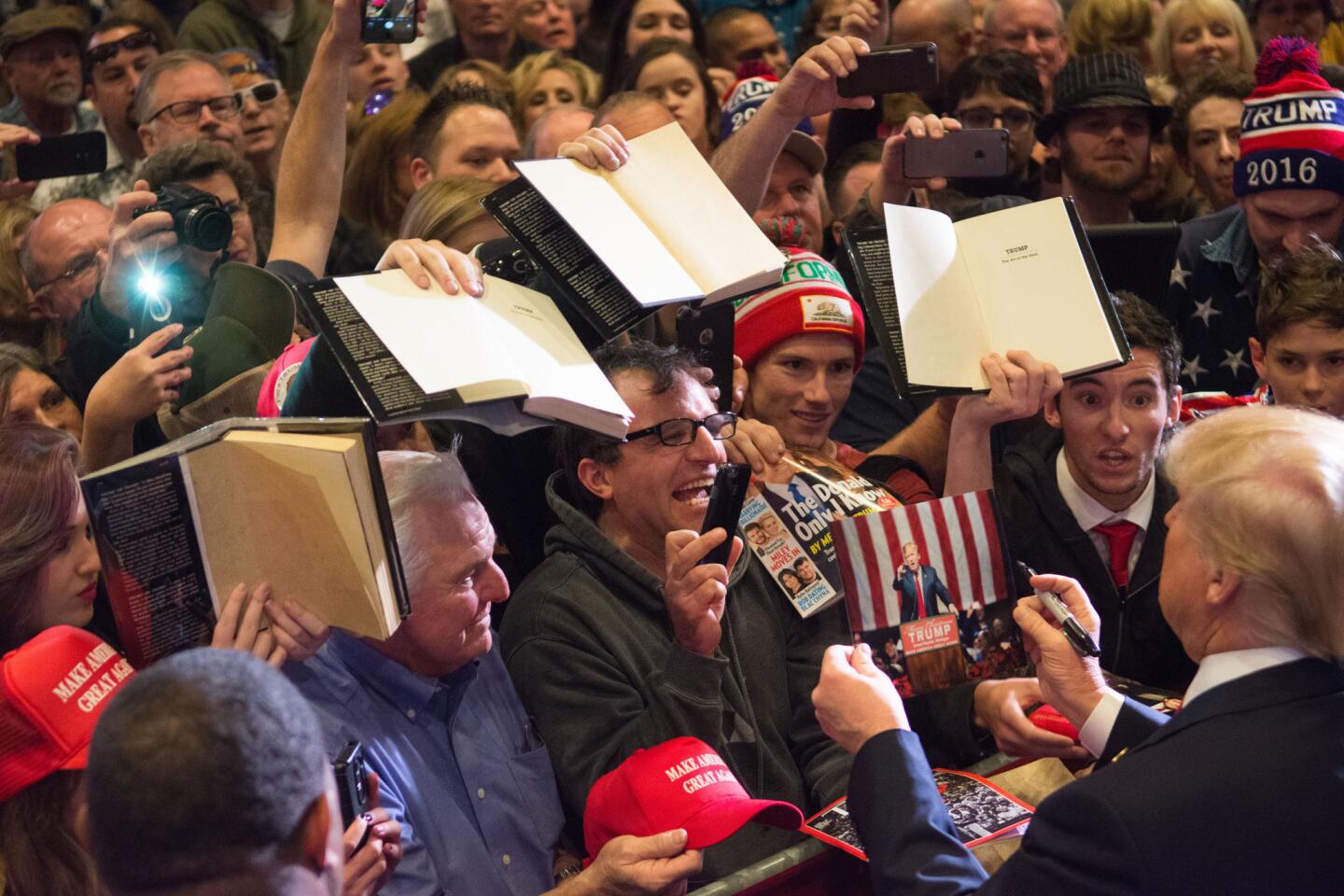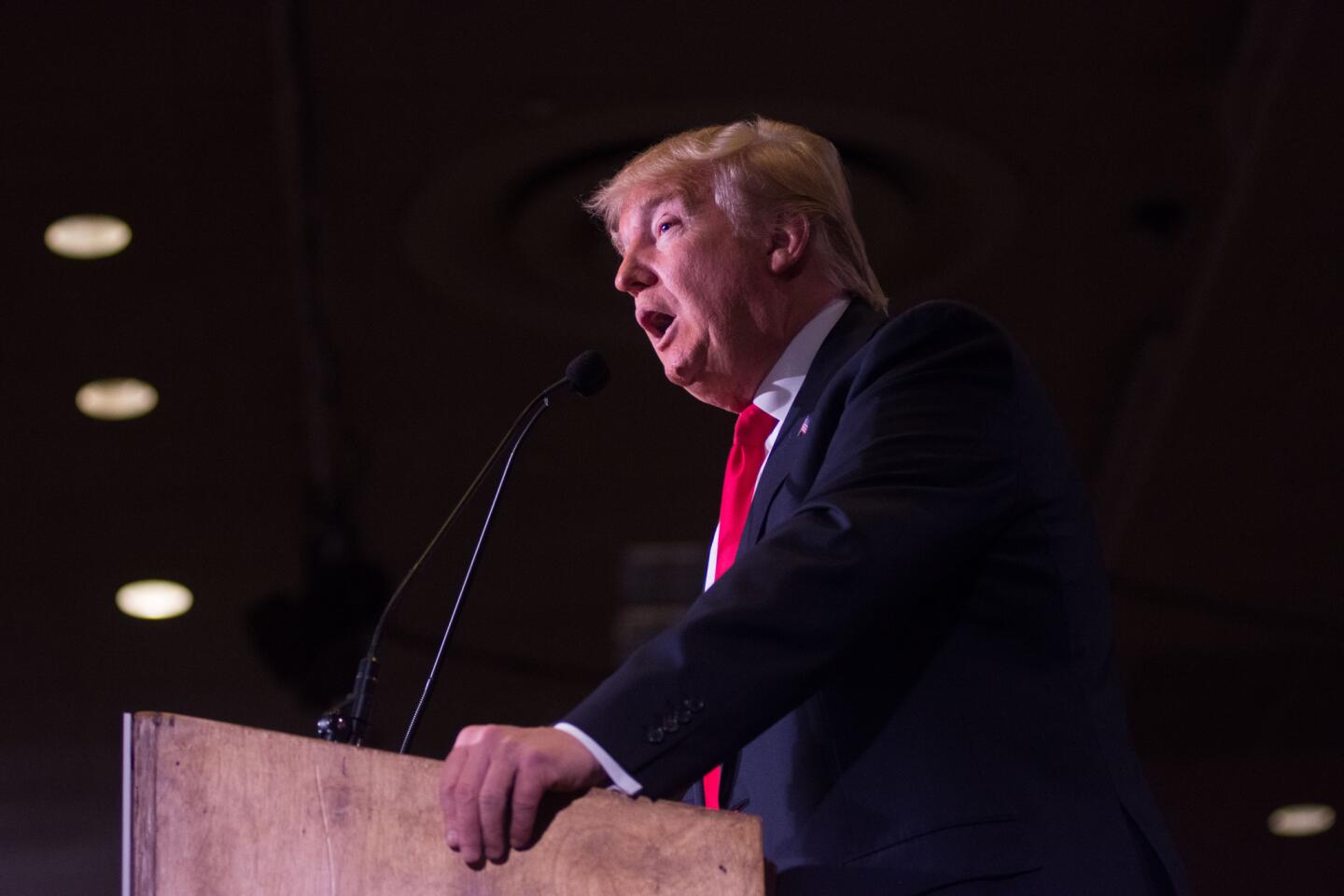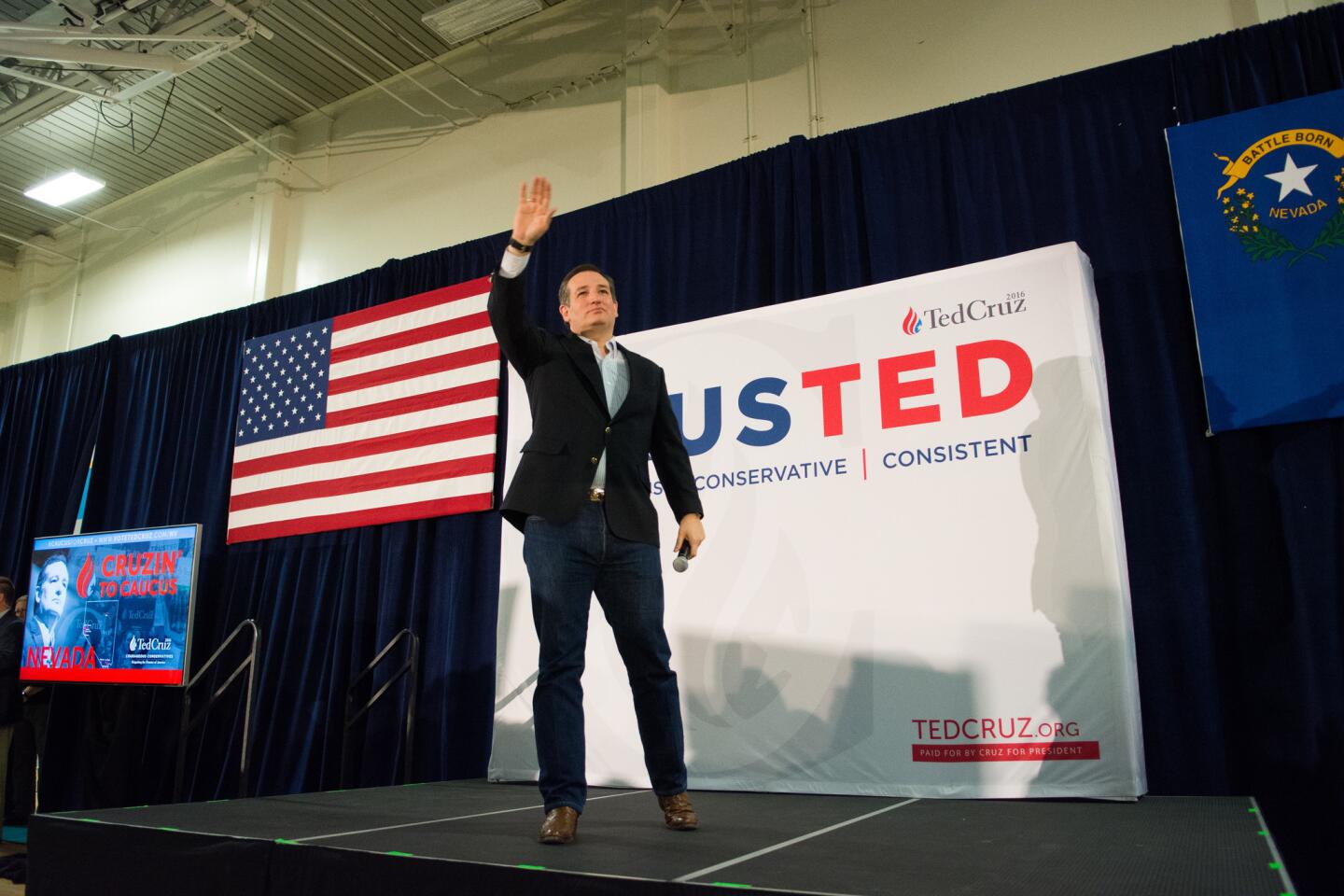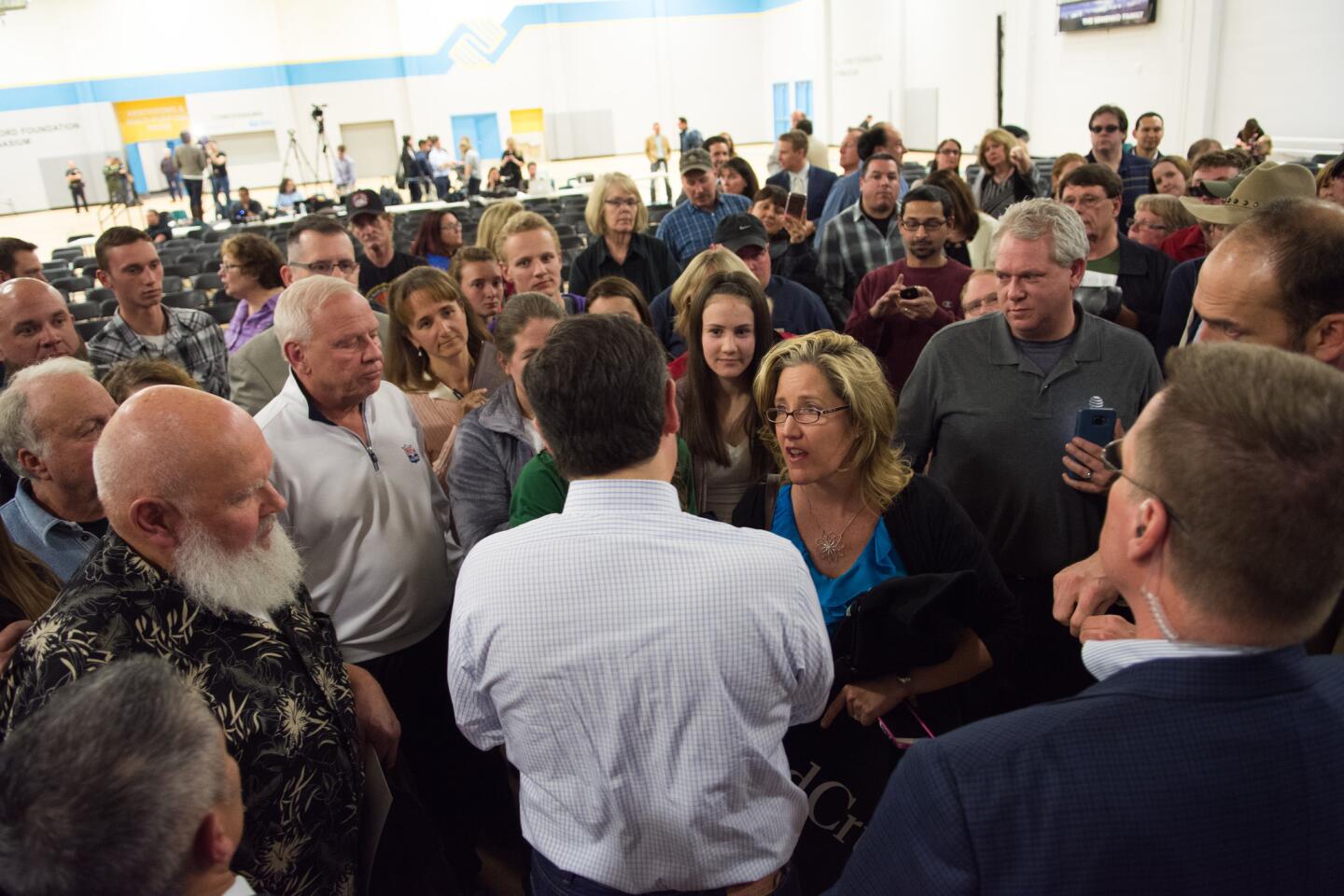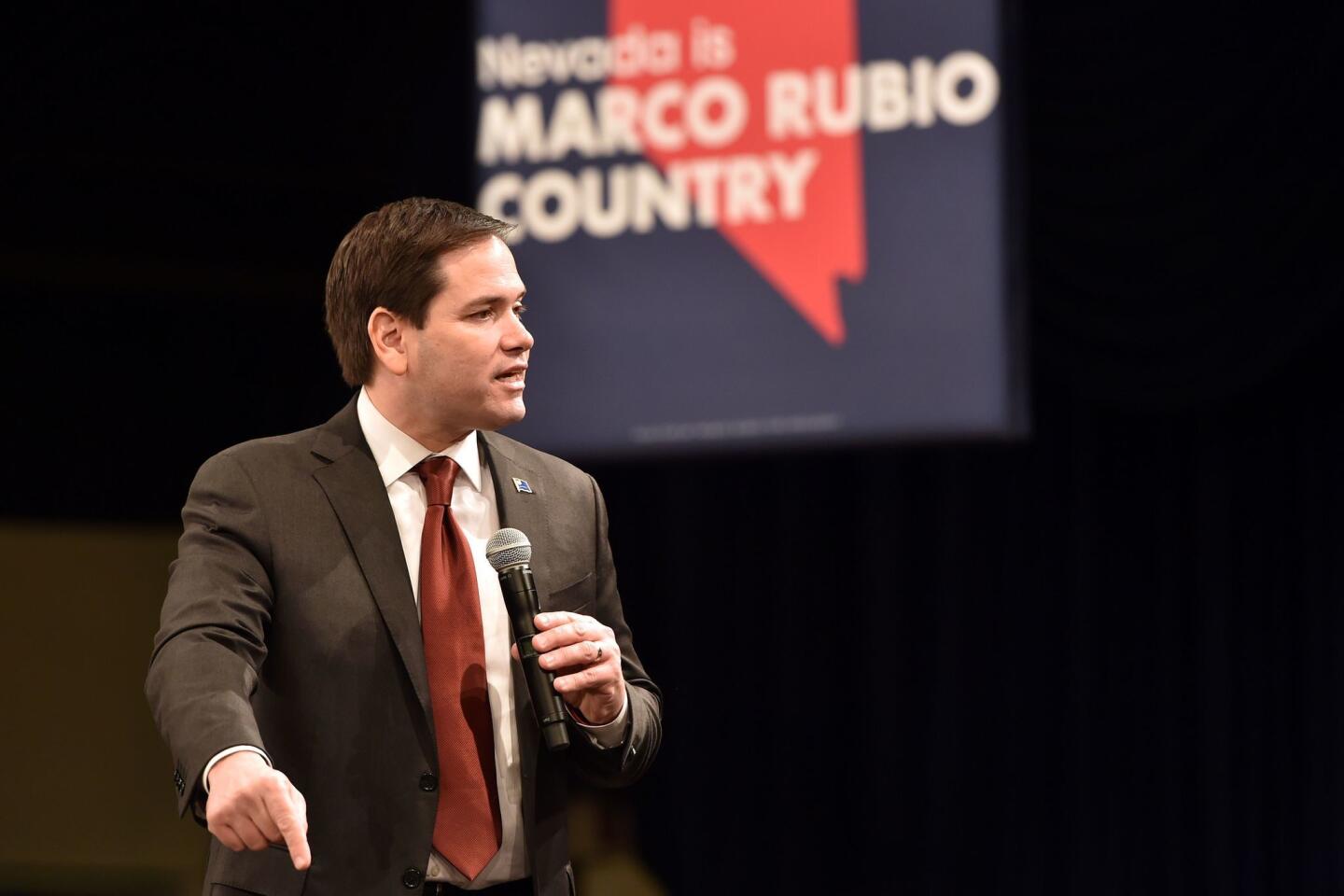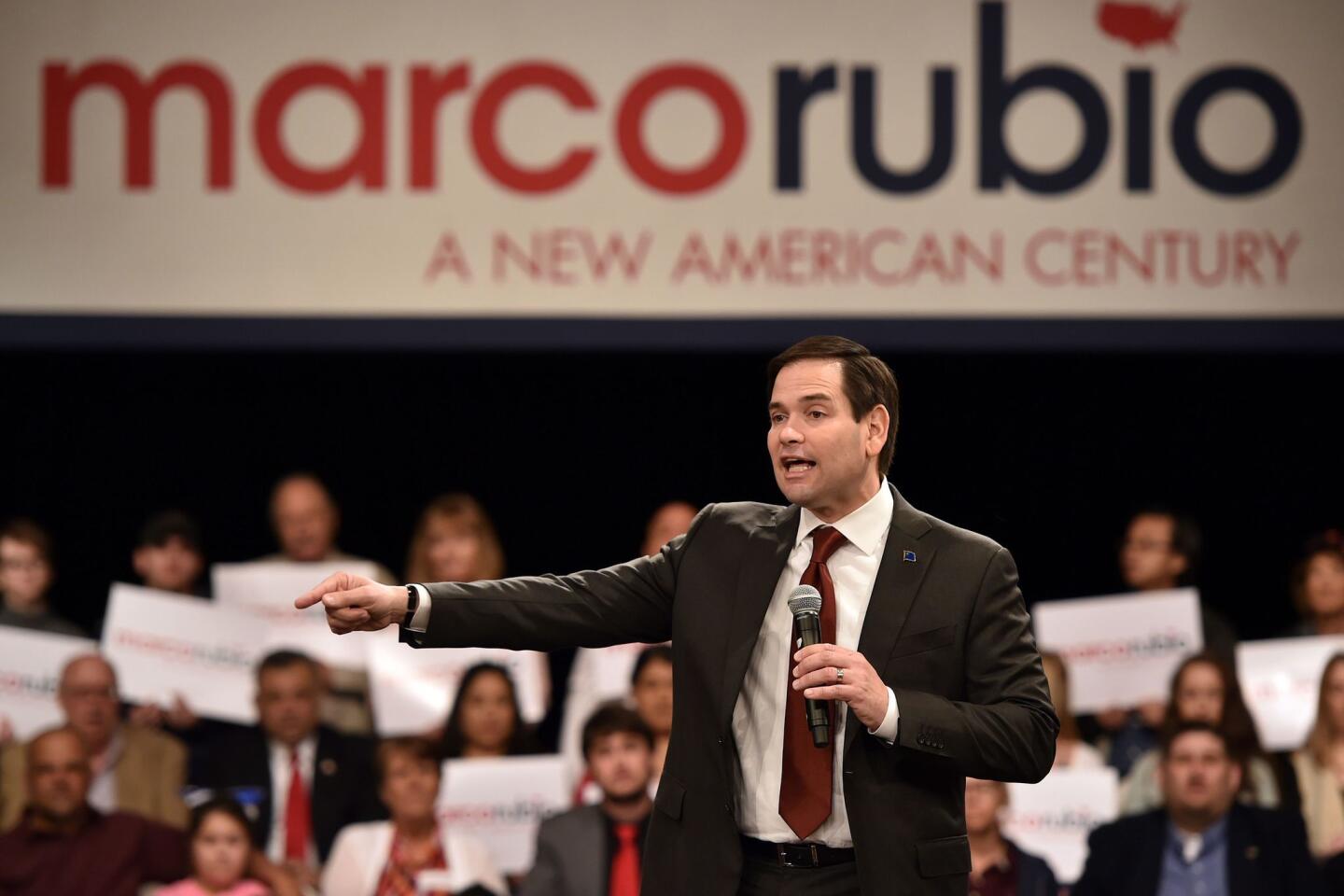Trump wins Nevada caucuses, fortifying his lead in the Republican race
- Share via
Reporting from Las Vegas — Donald Trump romped to a third straight election victory Tuesday night, winning the Nevada caucuses and solidifying his position atop the Republican field as the presidential race now expands into a nationwide test.
Sen. Marco Rubio narrowly edged out Sen. Ted Cruz for second place. With all precincts reporting, Rubio led Cruz by just under 2,000 votes.
Trump’s win, taking 46% of the vote, was the latest in a string of victories, which once seemed implausible for a candidate who started with exceedingly high voter disapproval and exceedingly low regard from political professionals. He has now won in three disparate parts of the country, the West, the South and the Northeast.
Trump, flanked by his sons at a Las Vegas casino, exuberantly declared victory less than an hour after the caucus sites closed, saying his success would be good for the nation.
“If you listened to the pundits, we weren’t expected to win too much, and now we’re winning, winning, winning the country. And soon the country’s going to start winning, winning, winning,” he said.
He predicted victory in several upcoming contests, including in Cruz’s home state of Texas and Gov. John Kasich’s home state of Ohio.
“It’s going to be an amazing two months. We might not even need the two months, folks, to be honest,” Trump said, suggesting he would quickly wrap up the nominating fight.
A subdued Cruz, speaking to supporters at a YMCA in Las Vegas, noted that no one had ever won the Republican nomination without prevailing in at least one of the first three contests.
“The only campaign that has beaten Donald Trump and the only campaign that can beat Donald Trump is this campaign,” said Cruz, the winner of the Iowa caucuses. He flew straight to Houston, to begin campaigning ahead of the state’s primary next Tuesday.
Rubio left the state hours before the caucuses began and made no public appearances after the results came in.
A scant 30 delegates were being contested in Nevada, a relative newcomer to the early presidential balloting.
But the candidates competed fiercely in the state’s precinct caucuses, mindful how the results might shape the race a week later on March 1, or Super Tuesday, when the stakes grow exponentially higher.
Nearly 600 delegates will be awarded in 12 states, or about half the total needed to become the GOP nominee.
It was an ornery electorate that vented Tuesday at the polls.
Well over half the GOP caucusgoers said they were angry at the federal government, according to interviews conducted as voters arrived at their caucus sites, a higher percentage than in earlier contests in Iowa, New Hampshire and South Carolina.
About 6 in 10 caucusgoers said they wanted the next president to come from outside the political establishment, and Trump won the overwhelming majority of those voters, according to the survey conducted by a consortium of TV networks and the Associated Press.
Given rocky past experience, Nevada’s caucuses were shrouded in concern.
The state Republican Party, torn by infighting, performed miserably in 2012. It took three days to count 33,000 votes and declare a winner.
Social media were filled Tuesday night with reports of irregularities, including people voting more than once, some caucus overseers failing to check voter IDs and others being careless with piles of ballots after they were cast. A few sites with larger-than-expected turnout ran out of paper ballots.
But the state GOP, in a response on Twitter, said there were no official reports of violations or misconduct.
After a complaint from a Trump lawyer, Nevada’s GOP barred the public from videotaping activity at voting sites, something Cruz’s campaign had suggested to supporters to guard against misconduct.
Trump turned that around to accuse Cruz of engaging in dirty politics.
“A lot of dishonesty out there,” Trump said at a boisterous afternoon rally in Sparks.
The Rubio camp chimed in as well, urging supporters in an email to watch out for “a disturbing pattern of dirty tricks” by the Texas senator.
Cruz ousted his communications director, Rick Tyler, on Monday after he claimed Rubio could be heard disparaging the Bible in a video he posted on social media. The allegation was false and Tyler apologized.
Asked about Trump’s criticism, Cruz said the billionaire businessman is “welcome to throw any insults he likes at whomever he likes.”
“We’re going to keep this race focused on issues and substance,” Cruz said Tuesday night during a stop by a caucus at Reed High School in Sparks. “His record and my record — and my positive vision for turning this country around.”
But the firing of Tyler on the eve of the Nevada vote lent credibility to weeks of accusations by Trump and Rubio that Cruz has run a dishonest campaign.
Cruz, who won the Iowa caucuses on the strength of evangelical support, has made faith and morality a centerpiece of his presidential bid.
The Nevada campaign was a brief one, the vote coming just three days after the South Carolina primary, which Trump won handily.
He barreled into the state on the strength of that performance, a commanding victory in the New Hampshire primary and a name that needed no introduction to Nevadans. Trump’s gold-sheathed hotel just off the Las Vegas Strip — topped by his brand name — is visible for miles.
Rubio, who lived in Las Vegas for several years as a boy, ran a more conventional campaign, rounding up endorsements from elected leaders and making the case for his electability in November. He has yet to win a state in four contests.
“Frustration’s not a plan,” the Florida senator told several hundred supporters at the Silverton casino resort in Las Vegas, where he appeared early Tuesday before heading to Michigan. “Being angry is not a plan. This election can’t just be about making a point. It can’t just be about electing the loudest person in the room.”
Rubio argued that he could expand the Republican Party by appealing to “all of these folks that work in the hotel rooms here — that clean the rooms like my mom did, that serve the drinks behind the bar like my father did.”
Cruz and Rubio were both competing for support among the state’s small but politically influential Mormon community, which powered Mitt Romney to victory in the 2008 and 2012 caucuses.
Those were the only previous contests in which Nevada voted early, part of an effort by the national parties to give Western voters a greater say in their nominating processes.
Kasich, the second-place finisher in New Hampshire, did not compete in Nevada. Instead, he was aiming at a handful of Super Tuesday states and staking his campaign on a March 8 win in the Michigan primary.
Kasich and retired neurosurgeon Ben Carson finished far behind Rubio and Cruz in Nevada.
Twitter: @markzbarabak
Twitter: @LATFinnegan
Barabak reported from San Francisco and Finnegan from Las Vegas. Times staff writers Kurtis Lee in Sparks and Seema Mehta in Los Angeles contributed to this report.
More to Read
Sign up for Essential California
The most important California stories and recommendations in your inbox every morning.
You may occasionally receive promotional content from the Los Angeles Times.
